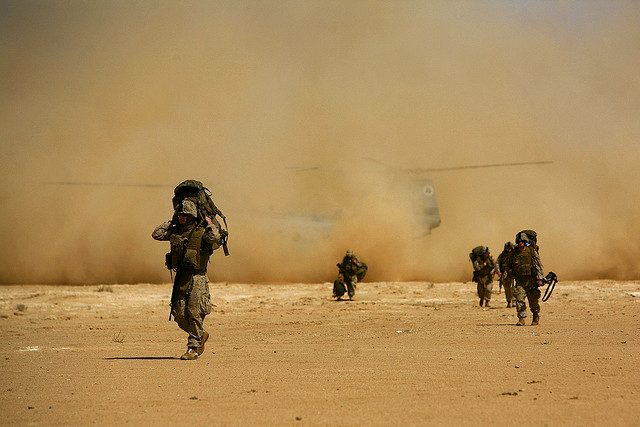After a year of ‘degrading and destroying’ Islamic State (IS) overseas and well over a decade confronting the broader threat of Islamist militancy at home, there are no doubts: we are losing on both fronts. Internationally, IS now lays claim to increasing amounts of territory in Syria and, with the fall of Ramadi, burrows deeper into Iraq’s Anbar province. IS’s transnational wilayets (provinces) have grown and become increasingly active while foreign fighters continue to stream into IS-controlled areas.
Domestically, the threat posed by home-grown, Islamist-inspired actors has increased, especially in New South Wales and Victoria—the same states that have provided many Australian IS recruits. As Prime Minister Tony Abbott recently stated: ‘on all metrics, the threat to Australia is worsening’. Despite the gravity of the situation at home and abroad, rather than critically examining the fundamental assumptions underpinning our strategies, the dominant response is to merely tinker with current approaches and allocate more resources.
For example, while admitting that the United States was yet to develop a ‘complete strategy’, President Barack Obama announced that up to 450 more US advisers and trainers would be sent to Iraq. The current anti-IS campaign, which Obama ominously stated is based on a strategy ‘we have successfully pursued in Yemen and Somalia for years’, is fundamentally military-centric and hinges on Anbar’s Sunni populations turning against IS as momentum builds behind Iraqi army successes. In interviews with residents of Mosul who had recently fled the city and viscerally despised IS, they stated that given a choice between IS and the Iraqi government, they’d choose IS because they hated the government more. IS represents more than just a military or ‘top-down’ political problem but a ‘bottom-up’ issue of governance functionality and legitimacy that won’t be addressed by the return of the Iraqi government.
These problems are reflective of a deeper issue: the West is yet to understand what IS actually is. While many may hope otherwise, IS is a modern insurgency. They rhetorically refer to themselves as a ‘state’ but IS’s own documents reveal its campaign strategy to be an insurgency. Without appreciating the complexities of the IS phenomenon, it’s easy to falsely believe that IS reverting to asymmetric operations is a sign of weakness or to forget that 10,000 dead IS fighters isn’t as significant if airstrikes have boosted their recruitment.
IS’s ‘information operations’ (IO) campaign has been central to its ability to recruit and mobilise supporters locally and transnationally. However, IO remains the strategic weakness in Western counterinsurgency and counterterrorism efforts. As long as analysis of IS propaganda fixates on ‘slick production’ and IS’s use of social media to explain its appeal—erroneously confusing means of communication with its meaning—counter-narrative strategies will continue to flounder. The implications for Australia’s domestic efforts are significant because IS messaging is clearly resonating in small sections of Australia’s Muslim communities. This should concern counterterrorism officials because it demonstrates that almost fifteen years of counterterrorism efforts haven’t made the domestic milieu less susceptible to radicalisation. While there are many contributing factors, one worth considering is the potential role of misguided domestic counterterrorism efforts.
Deradicalisation and counter-radicalisation initiatives, often central to ‘countering violent extremism’ (CVE) strategies, aren’t new to Australia. These types of programs have been running, for example, in Victoria for almost half a decade. The wave of government-led counter-radicalisation and deradicalisation programs that were implemented in countries like Australia and Britain focussed heavily (although rarely solely) on countering ‘extremist ideology’. Yet there’s growing support for the contention that when governments, especially non-Muslim governments, actively prescribe what is an appropriate interpretation of Islamic doctrine via deradicalisation and counter-radicalisation strategies, such efforts may instead act as catalysts of radicalisation amongst those most susceptible to radicalisation.
One reason is that such strategies tend to give veracity to militant narratives that argue governments are disproportionately targeting Muslims and changing the fundamentals of Islam via ‘soft’ counterterrorism efforts. Moreover, these CVE strategies typically recruit ‘moderate’ Muslim community figures as representatives. Unfortunately, that often undermines the credibility of those community figures actively involved in the program and anyone else espousing a similarly ‘moderate’ interpretation of Islam, especially amongst radicals in the community and those most vulnerable to their narratives.
The result can be a compounding cycle of negative returns: militant narratives of a government-sanctioned Islam increasingly resonate while the moderate voices so essential to countering extremism lose credibility and legitimacy amongst those most susceptible to radicalisation. Indeed, IS narratives targeting Western audiences regularly leverage these factors. It’s curious that in the Western nations that have implemented such strategies, the home-grown threat has often increased and foreign fighters from these nations feature prominently in IS ranks. Of course, such correlation doesn’t imply causation, and a complex range of factors lie behind these trends. Critically examining all our counter-terrorism efforts has value in itself, especially given current trends.
The predicament facing Australia and its allies is fundamentally rooted in an intellectual failure to adequately understand these phenomena and then critically debate strategic options. We will have to get used to losing to IS at home and abroad if all Australia and its allies do is pump more resources into the same strategies. Indisputably, the men and women on the frontlines of this battle deserve better.


